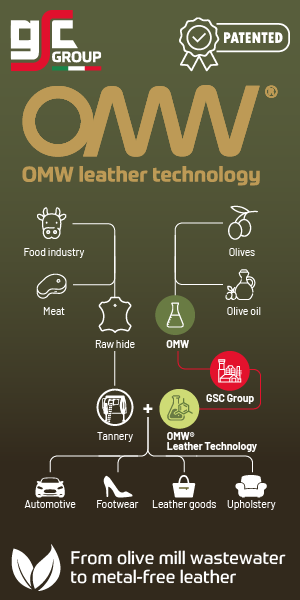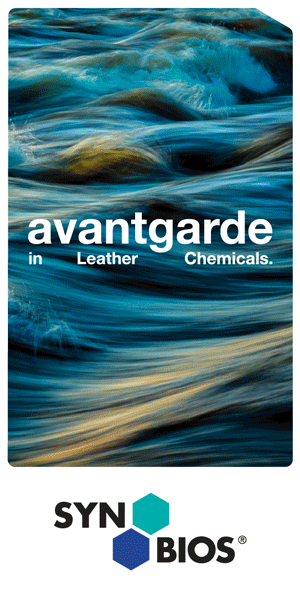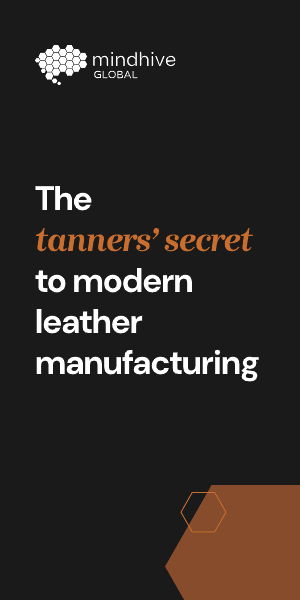Nuno Carvalho: Fight the good fight

In late 2019, Nuno Carvalho, president of Portugal’s main leather industry body, APIC, published an article in the main national newspaper strenuously defending the industry against unfair criticism over environmental standards at its main production centre, Alcanena. He felt the days of simply waiting for troubles to pass over had to end.
What was the background to the public criticisms that the leather industry in Portugal in general and in Alcanena in particular suffered at the end of 2019?
In early July 2019, the municipality of Alcanena took over the running of our common effluent treatment plant. The wastewater treatment plant at Alcanena had been under control of the Portuguese tanners for 25 years. But the town authorities took over after a series of arguments and counter-arguments lasting around two years between our industry body, APIC, and the local authority. APIC tried to warn national authorities, such as the ministry for the economy, the ministry for the environment and even the prime minister and the president of Portugal of the risk of putting a public body in charge of a complex system such as the Alcanena common effluent treatment plant. We tried to alert the media, too. But in the end, it was a political decision.
How familiar were the people in the local authority with the leather industry?
Alcanena lives from leather. Almost 90% of the people who live in Alcanena work in the leather sector or have family members who do. The municipal authorities in Alcanena created a new company, Aquanena, to run the wastewater treatment plant. They broke the existing contract with the professional body that had been running the plant, Austra, and took over. Austra is the specialist organisation that has run the wastewater treatment plant for years on behalf of the Portuguese leather industry and had a contract to continue until 2024. Austra had been doing a very good job. Its accounts were balanced and the cost to tanners for running the plant had come down. The rates we were paying at the end of Austra’s mandate was three times cheaper than at the start of Austra’s involvement. Our fear is that it will now become more expensive, which will make our members less competitive in the global leather market. Aquanena has to pay compensation to Austra for terminating the contract early. Also, Austra was ready in 2019 to invest in technology that would have meant wastewater in the end was 100% clean and, in the end, this was not done. When Austra started to hear about the possibility of the takeover, it said it would not invest the money. And because the water that leaves the ETAR (wastewater treatment plant) goes directly into the local river and, from there, into the Tagus [the longest river in the Iberian Peninsula, which flows into the Atlantic in Lisbon], the investment has to be made. We are speaking about €500,000. Aquanena has to raise money to make this investment, and it has to pay Austra compensation.
Where is it going to get the money?
From the industry. They will ask us for more, although they say they will not increase the prices we are paying for five years. We will see what happens.
How did the transition work out?
The national authorities told us that the local body had the power to make its own decisions. Due to the lack of experience of the new company the biological phase of the wastewater treatment plant was put out of operation in July. It was a holiday period. On August 15, when all the tanneries were closed, people in the area started to notice unpleasant odours. Something similar had happened some years before. Austra invested around €1 million to prevent it happening again and the ten main tanneries, the ten out of a total of 60 that carry out the whole process rather than work from wet blue or crust, invested a total of around €3 million in pre-treatment. Those investments worked and the problem did not occur again. The new company took over on July 5 last year and by August 15, the bad smell was obvious. It was because the biological treatment plant had failed. The tanners were on holiday and no wastewater was coming into the plant. That meant they needed to make an adjustment to the biological plant. They didn’t know how to do that and the bacteria used in this treatment phase died. They never went public with what had happened but this is a small place and everyone understood what was going on. It takes something like two months to restart a biological treatment plant, but the smell stopped from mid-October, which is when the biological plant was right again.
Why did you take the step of writing to a national newspaper to protest and to defend the leather industry?
Local people were very upset with the situation and started complaining about it, including in the local press. The new company pointed the finger at the leather industry. There was a lot of noise about the situation and the image of the leather industry in Portugal suffered from all the criticism. We felt the need to put the record straight and to defend the Portuguese leather industry, but we took some time to let everything calm down and it was only after that that we made our public statement. We wrote an article with a full explanation of what had happened and also described the path the Portuguese leather industry had taken in the past decade, showing its success in terms of turnover, job creation, international promotion and exports. We wanted to clean up our image.
What reaction did you receive after making that statement?
I would say that we didn’t hear anything from the local authorities. But it was in the most important national newspaper so a lot of people said that what we had done was very well done because it allowed us to defend our image and put out correct information in contrast to the fake news that had run.
What is the situation in Alcanena and in Portugal now?
I hope the situation has calmed down. When Austra was there, we knew what was happening. Nowadays we don’t know.
How do you see the situation of the global leather industry?
I think the worst is over. It’s difficult to survive with lobbies working against you in the background, including lobbying from the brands. If we go back four or five years, raw material was so expensive that nobody could touch it. It was only to be expected for the brands to give designers the instruction to move away from leather. That was normal. It was too expensive and they were not making money. They could not increase the price of a pair of shoes so they had to try to do things in a different way, moving away from leather. They had the power to do that and they were successful in doing it. There was less demand for leather and, at the same time, there was an increase in demand for meat, especially from the Far East. There were more hides and the prices had to come down. Today, we have historically low prices. I believe, and there are some signs of this, that leather will start to go into collections again, including in footwear. A lot of the alternatives, especially technical textiles, are very expensive at the moment. In the next two years, you will see some brands asking for leather again. But, in the meantime, some of our companies, globally, will disappear because they cannot survive. You can lose money for one year or two years, but after that, if you don’t have strong backing, you cannot survive. You cannot keep losing money for five, six, seven years. You have to close down. That’s a global thing, but what is happening globally will affect Portugal, Spain, Italy and everywhere.
What are the most important arguments we can present to defend leather against those materials?
It’s not easy to formulate an emotional argument. The leather industry is a family. It’s a small world. We who are leather people know what we are talking about. We know the advantages of leather. But there is a gap in the information that we have been able to pass on to the wider public, especially to the young generation. That’s what we have to work on, very hard. Leather Naturally is doing a very good job on that, but we need much more than Leather Naturally. We have to fight against other lobbies that are much stronger than leather. We are the poor guys being squeezed by the meat companies on the one hand and by the brands on the other. When everyone was selling their leather quite well, nobody cared about sharing information about what made leather special compared to synthetics. Now that a crisis has come, people are starting to cry about it and are starting to do what they should have done years ago to protect the image of leather. Now that we are obliged to do something about this, we have started. These things take time, but it’s better to do something late than never.
What makes you optimistic about what the 2020s might hold for the global leather industry?
I have been in the industry 37 years and have seen many ups and downs. We have to be strong and search for alternative markets. We cannot avoid questions on sustainability, traceability and authenticity. Addressing those questions is the only way we can survive.
Nuno Carvalho has been president of APIC since 2015. He runs specialist footwear tannery António Nunes de Carvalho in Alcanena, which is part of the Carvalhos Group, which also runs automotive tannery Couro Azul. The family-run group was founded in 1939.The Leather Leaders interviews are also available in audio format, along with a wide variety of World Leather podcasts. Please search for World Leather on Spotify, Google Podcasts, Apple Podcasts or Medium to enjoy them all.





























